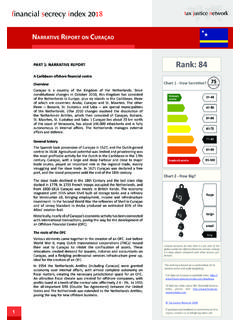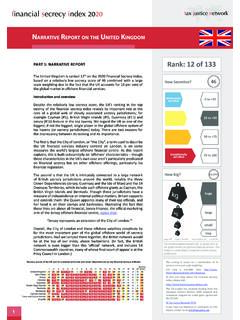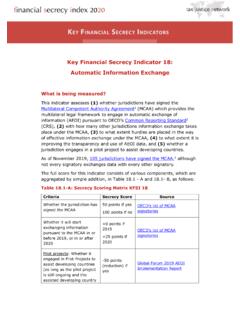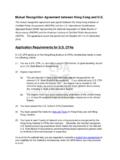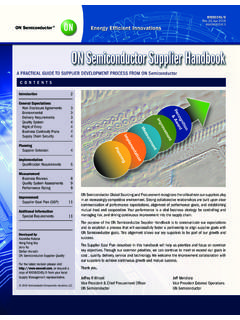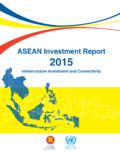Transcription of Narrative r oN the British v slaNds - Introduction
1 PART 1: Narrative REPORTO verview and backgroundThe British Virgin Islands (BVI) is ranked at 16th position in the 2018 Financial Secrecy Index. It has a relatively high secrecy score of , though it accounts for only a small share of the global market for offshore financial services. Yet its relatively low ranking in our index seriously understates its true importance in the world of offshore secrecy, as this report BVI is an archipelago of about 60 Caribbean islands with fewer than 23,000 inhabitants. It is a British Overseas Territory, substantially controlled and supported by Britain, but with a fair degree of political autonomy.
2 The UK ultimately has the power to strike down BVI secrecy legislation, though it chooses not The BVI has long been linked to wave after wave of scandals; Lord Oakeshott, a former top UK politician, said in 2013 that the BVI stains the face of Britain. 3 Nevertheless, it has made some significant improvements in transparency in recent years, improving its secrecy score, though secrecy remains a key hallmark of its offshore secrecy here comes most importantly from the BVI s lax, flexible, ask-no-questions, see-no-evil company incorporation regime, which allows owners of companies to hide behind nominees to achieve strong secrecy4, and to set up companies quickly and at low cost.
3 This supposed efficiency of incorporation has translated into carte blanche for BVI companies to hide and facilitate all manner of crimes and abuses, worldwide. This tiny state where financial services directly make up around half of government revenue (p6)5 is a quintessential example of a jurisdiction captured by offshore financial services, with almost no local dissent against offshore BVI is now the world s leading centre for company incorporation, with a thriving industry selling corporate secrecy and over a million shell companies incorporated since landmark legislation was introduced in 1984.
4 In 2017, there were 417,000 active companies: 18 for each inhabitant. Two thirds of the companies, according to research carried out for the BVI,6 are corporate subsidiaries; another quarter are funds and investment vehicles, while family wealth and property holdings account for another five per cent each. The development charity Action Aid found in 2013 that 98 of the companies in the FTSE 100 had BVI of the nearly quarter of a million companies set up by Mossack Fonseca that the Panama Papers identified were incorporated in the BVI.
5 The leak could just as well have been called the BVI IMF in 2010 estimated,9 very conservatively, that BVI companies held over $600 billion in This figure was more than doubled in 2017, when new research commissioned by the BVI found that BVI companies control $ trillion in assets11 (These are mostly not held in the BVI: two-fifths are in Hong Kong and China.) Based on Gabriel Zucman s research into the size of global offshore assets and the likely tax loss,12 this figure suggests that the BVI is responsible for global tax losses of $ The BVI has expanded its range of offshore offerings since the industry really took off in the 1980s, and today it is 1 Rank: 16 Narrative report oN the British virgiN islaNdsChart 2 - How Big?
6 The BVI account for less than 1 per cent of the glo-bal market for offshore financial services, making it a small player compared with other secrecy ranking is based on a combination of its secrecy score and scale weighting. Full data on the British Virgin Islands is avai-lable here: find out more about the Financial Secrecy Index, please visit Tax Justice Network 2018If you have any feedback or comments on this report, contact us at 1 - How Secretive?Secrecy Score692also a leading domicile for mutual funds, shipping registration, hedge funds, and captive insurance, many of which also use BVI companies and paper, the BVI was the ninth largest recipient of Foreign Direct Investment (FDI) in 2015 (p78)14 and the world s seventh largest source of outbound FDI.
7 In reality, the BVI is merely a conduit or brass plate for licit and illicit financial flows between countries. The BVI has almost no taxes: no effective income tax, no capital gains tax, no inheritance taxes, no gift taxes, sales taxes or even value added taxes. It raises income mainly through payroll taxes, land taxes and various fees. This is a classic tax haven pattern of creaming small amounts each time from a large numbers of transactions, and relying on locals to pay the the BVI became a secrecy jurisdictionThe BVI s modern offshore sector was born in 1976 when Paul Butler, a lawyer from the Wall Street firm Shearman and Sterling, called the only law office in Tortola (the largest Island in BVI), then staffed by two Oxbridge-educated British lawyers,15 Neville Westwood and Michael Riegels.
8 In those days multinationals were running lucrative tax avoidance schemes through the Netherlands Antilles (see box, and our Cura ao report). Yet many firms were unhappy about the Dutch language barrier and about the questionable legal basis for the Antilles loophole. Butler had become aware of similarly lenient DTAs between the and various Caribbean micro-states, including the English-speaking BVI. Riegels quickly agreed to incorporate a BVI company for Butler. As his son Colin Riegels later explained, this was the opening though which a whole new world of tax avoidance emerged.
9 Corporate business began to grow steadily and was soon producing modest fee income for the BVI (at vastly greater cost to the Treasury.)16 But in 1981, disaster apparently struck, nipping this fledgling industry in the bud. The government produced a hard-hitting report on tax evasion and tax haven abuses,17 fingering the BVI in several instances, and voicing emerging concerns that it is generally a bad idea to sign DTAs with tax The suddenly terminated its double tax agreement (DTA) with the BVI, among others.
10 It could have been the end for the fledgling BVI tax haven. Instead: it spurred a completely new way of doing off: the International Business Companies Act of 1984 Paul Butler, the Wall Street lawyer, suggested that the best way to respond to the treaty cancellation was to offer a completely new offshore product that was not designed to provoke corporate tax leakage in the United States (and thus defensive counter-measures from the world s most powerful country) but would instead target wealthy individuals in countries around the world, particularly vulnerable and corrupt developing countries that would not have the powers to defend themselves.
